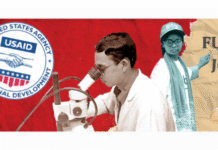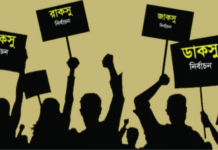Inclusiveness means accepting and celebrating the diversity all around us. Diversity truly reflects the mosaic that is society.
Its most visible champion is Justin Trudeau, the youthful and telegenic prime minister of Canada. The concept, which has gained traction in the West, liberates the mind from outmoded blinkers and helps recognise differences between individuals. Mere recognition is not enough – mutual respect is called for. The idea spread over time with the evolution of society. The epic struggle of blacks in the US for equal rights must go down in history as a spur.
Hidebound thinking is the enemy of inclusiveness. It prevents openness and liberal views, and breeds bias leading to contempt. The recent abhorrent treatment of Santals arises from such crooked mentality. The barbarity unleashed in Brahmanbaria is another odious example. Christians and people of different ethnic groups have their own litany.
It is not for nothing that diversity has gained a foothold in advanced (and highly competitive) countries. America, for example, celebrates immigration that has enriched the country in so many ways. Media crows about immigrants who have become billionaires. Because of its unique diversity, America is a crucible of many interesting social experiments. There is no harm in learning globally and applying locally.
Most American buildings have ramps for people with disability — an example of accommodation for people with special needs. Buses and toilets are similarly retrofitted. Law, of course, has a role to play. In Bangladesh, we are woefully behind when it comes to accessibility.
Gender differences spring to mind when diversity is discussed in the context of Bangladesh. Religious differences are a close second. Asymmetries in physical and mental abilities are other examples. Frankly, differences abound in every society – be it in terms of income, wealth or educational attainment.
In our country, discrimination on the basis of gender is the most nefarious manifestation of non-inclusiveness. Son preference is strong. This bias perpetuates itself when it comes to dealing with children’s health and education -spending on the son outstrips that of the daughter. Resultantly, the adult male is much better able to tackle life’s challenges, the most prominent being livelihood. Scores of girls remain dependent all through their lives. Perhaps we fail to appreciate that an educated and healthy mother can raise healthy children – a sine qua non of thriving communities. Adult education on a massive scale is necessary to wean us away from this regressive practice.
Bangladeshis have traditionally prided themselves as a tolerant nation. But lately, noxious behaviour on the part of a few sociopaths has grabbed headlines and snared Bangladesh in the orbit of terrorism.
Inclusiveness has two drivers – altruistic and economic.
As the gender issue highlights, it is inconsiderate, morally wrong and perhaps cruel to discriminate against fellow human beings. Bangladesh gives short shrift to people with disabilities and the elderly. Our senior citizens have done their part when it was their turn and now deserve respect and consideration. Add to this the horrible treatment meted out to our children – a vulnerable section of society.
Studies have shown that participation of women in the workforce pays handsomely. The prosperity of OECD countries is proof. Its corollary: to be productive women have to get education and training at par with men. Also, consider the fact that with increases in longevity many older people in the West chose to remain active economically. This goes to show that a nation fails to achieve its true potential unless all ‘hands are on deck’.
Illiteracy is the seedbed of social ills. In order to fight evils emanating from ignorance literacy as narrowly defined won’t cut it. One has to be broadminded to be accepting of diversity. Clearly, this quality will only flourish when people are enlightened. While the demand aspect is not amenable to quick fixes, the government, with its ample resources, should take urgent steps to plug the supply side.
A nation’s treatment of the old, infirm and the needy is an important indicator of its stage of development. It is now time to up the ante and give voice to the marginalised, listen to their grievances and embrace them as equal and valued members of an inclusive society.
* Raihan Amin is an adjunct faculty at United International University
Source: Prothom Alo









